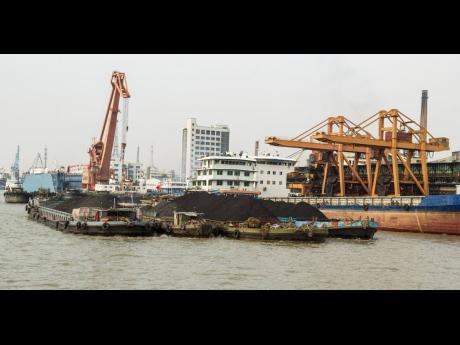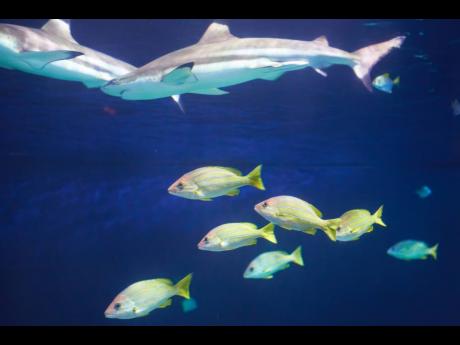Theresa Rodriguez-Moodie | Deep sea mining not worth the risk
Scientists today know more about space than about the deep sea. This ecosystem is the largest on the planet, comprising over 90 per cent of the marine environment. In 1970, the deep sea was declared the ‘Common Heritage of Mankind’ to be preserved for peaceful purposes.
In spite of this recognition, mining this fragile and critically important environment could begin as early as 2023. The impacts of deep sea mining (DSM) have the potential to be devastating and global. In 2019, despite warnings of scientists and civil society groups across the world, the Government of Jamaica (GOJ) entered the DSM industry through its sponsorship of Blue Minerals Jamaica Limited (BMJ), a Jamaican registered company.
WHAT IS DEEP SEA MINING?
The deep sea is 200 metres to 11 kilometres beneath the ocean surface. Until a few years ago, many thought that not much life existed at such extreme depths. It supports some of the planet’s most stable and unique ecosystems which may be as diverse as the world’s richest tropical rainforests. It plays a critical role in regulating climate by absorbing the greenhouse gases and heat produced by human activity and is already under stress from pollutants, microplastics, and climate-related impacts.
It also contains deposits of copper, nickel, cobalt, silver, gold, manganese, zinc, among others, in high concentrations. DSM has been purported to be essential for sustainable economic development by mining interests, including our Jamaican Government (Source: Ministry of Foreign Affairs and Trade). Others believe that there is no need to mine the deep sea because adequate resources are already available.
WHAT ARE THE POTENTIAL IMPACTS?
The technology to undertake DSM is still in development. The general idea, however, is that a submersible craft, about the size of a bulldozer, will move in rows across the sea floor sucking up sediment laced with minerals. This sediment will then be processed and unwanted sediments returned to the sea.
The likely impacts include killing organisms and microorganisms in the path of these machines and underwater dust-storms creating sediment plumes four to five times the size of the area mined. The plume would not only affect organisms in the deep sea, but also other fisheries in shallow water as discharge plumes from the surface ship may travel thousands of kilometres. Noise will likely affect marine animals that use sound to navigate (dolphins, whales, and sea turtles). Since the deep sea acts as a sink for excess greenhouse gases and heat, mining could result in a release of these gases, further exacerbating the climate crisis.
The impacts on fisheries and other marine animals are not likely to be localised. If there is disruption to international fisheries due to DSM, distant international fishing fleets could begin pressuring Caribbean waters.
Test mining in the topical East Pacific 1989 by German researchers who simulated mining-related disturbances have shown that no life returned even after 26 years (Vonnahme, T.R. et al, 2020).
Additionally, DSM presents potential risks to the attainment of the Sustainable Development Goals (SDGs), and presents potential risks to Goal 4 of Vision 2030 Jamaica which is “Jamaica has a healthy natural environment”, since the risks associated with DSM are far-reaching and potentially devastating.
JAMAICA AND DSM
With this understanding of DSM and its impacts, let’s explore the links with Jamaica. The International Seabed Authority (ISA), headquartered in Kingston, is responsible for authorising and controlling development of mineral-related operations in the international seabed.
The 15-year contract between the Jamaican state and Blue Minerals Jamaica (BMJ) was signed on March 1, 2021, for the exploration of polymetallic nodules in the Clarion-Clipperton Zone (CCZ) of the Pacific Ocean.
While no DSM or exploration is contemplated in Jamaican waters at this time, DSM anywhere is likely to have global impacts. Additionally, Jamaica, as a sponsoring state, will have liability issues with which to contend. In 2019, the Jamaica Environment Trust (JET) sought clarity through the Access to Information (ATI) Act to better understand what this arrangement with BMJ would mean for Jamaica. We were denied access to the Sponsorship Agreement under Section 20 of the act, on confidentiality grounds.
A 2020 paper prepared by Deep Sea Conservation Coalition (DSCC) outlines that a sponsoring state is required to:
• Ensure that their contractor’s seabed mineral activities are carried out in conformity with Part XI of The United Nations Convention on the Law of the Sea (UNCLOS).
• Implement laws and establish national administrative measures that are “reasonably appropriate” for securing compliance by the mining contractor.
• Actively monitor the operations of its contractor, in coordination with the ISA, and keep legislation, regulations, and administrative measures under review.
A contractor who fails to meet the liability in full could put the sponsoring state at risk, if the sponsoring state (Jamaica, in this case) did not exercise the above due diligence or otherwise didn’t properly implement its obligations (such as to apply the precautionary approach). If a contractor does not or cannot pay the compensation ordered, and the sponsoring state does not hold an adequate bond from its contractor, then the sponsoring state could be pursued for compensation.
You might be wondering if the risks are the same for exploration. The potential for damage is less, but the real possible liability is that the contractors would have spent money on exploration with the legitimate expectation of then securing a licence to extract.
Odyssey Marine Exploration identified one of the most substantial phosphate sand deposits in the world in Mexico’s continental shelf and obtained the concession rights to mine it. The Mexican Government, however, blocked Odyssey by turning down a permit due to the precautionary principle found in national and international law, including risks to sea turtles. Now, Mexico is being sued by Odyssey for not less than US$3.5 billion, via an Arbitration Under the North American Free Trade Agreement.
Recently, Minister of Foreign Affairs and Foreign Trade, Kamina Johnson Smith announced that Jamaica would not support DSM without a suitable regulatory framework being first in place (JIS, August 2, 2022). We must note, though, that:
1. The regulatory framework is only as good as the regulator, ISA.
2. Monitoring activities in the deep sea presents a host of technical and financial hurdles.
3. There is very little environmental baseline data to provide a basis for monitoring or creating thresholds.
As we face the climate crisis, we must move away from technologies that could cause irreversible damage to the health of our planet. Some countries, for these reasons, are advocating for a moratorium or delay in seabed mining. We believe deep sea mining is not worth the risk.
Theresa Rodriguez-Moodie, PhD, is an environmental scientist and the CEO of the Jamaica Environment Trust. Send feedback to jamaicaenvironmenttrust@gmail.com.



